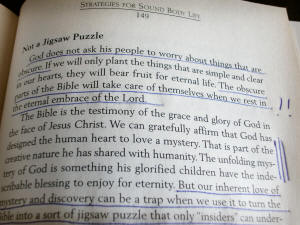GCI: Underlining Life
 Recently I read a book that challenged me, upset me and tested my attitude in a very unusual way. A friend found the book in a thrift shop where she worked, and having a Christian history similar to mine, she suggested I might enjoy it. It was one of those books that comes along just when you need it most, the kind that releases a cool breeze across your life. It filled in so many gaps that needed filling, but it also frustrated me so much that I could have thrown it into a river and smiled.
Recently I read a book that challenged me, upset me and tested my attitude in a very unusual way. A friend found the book in a thrift shop where she worked, and having a Christian history similar to mine, she suggested I might enjoy it. It was one of those books that comes along just when you need it most, the kind that releases a cool breeze across your life. It filled in so many gaps that needed filling, but it also frustrated me so much that I could have thrown it into a river and smiled.
The church that I have belonged to for many years was prone to doing a few doctrinal somersaults from time to time. Minor things came and went and came again and no one was too fussed. Then one day the church did the equivalent of a doctrinal double reverse pike with twist. Doctrines that I considered ordained by God himself, absolutes that were paramount to the practice of my religious life suddenly became irrelevant. At the time “traumatic” seemed a kind word.
Eventually I came to see what the church leaders were saying. “Jesus is the center of all things. Religious practice cannot compete with him or substitute for him.”
| |
| Time after time my eyes and then my mind were drawn to the heavily underscored text, leading me to places I didn’t want to go, to things I didn’t want to think about. |
I had no disagreement with that, so I settled down to reshaping my thinking according to the life and teachings of our Savior Jesus Christ in the light of the new covenant. Gradually, over a decade or so, my previous religious practices became less important as I increasingly comprehended the fullness of Christ.
The book that caused me so much unease dealt with those events, the whys and wherefores of it all, from an author who was right there in the moment.
That wasn’t what upset me, though.
My problem was that a previous reader had underlined everything he must have thought important with thick black lines (I’m assuming it was a man, though perhaps a woman might have used such an obtrusive pen). Besides his underlining, he had made comments in the margins and inscribed question marks that only he understood. This person obviously had not tasted the emotion of the moment or careered out of control down the roller coaster of “what abouts.” Their underlining was almost detached, the kind of underlining one would do to stress an interesting point of ancient history. It was not the heart of a person who had experienced the joy and the sting of the journey.
Time after time my eyes and then my mind were drawn to the heavily underscored text that sidetracked me into someone else’s ideas and opinions, leading me to places I didn’t want to go,
to things I didn’t want to think about. This person was at a different place from me on their spiritual journey, yet they were unknowingly forcing me to go there, even though I felt God wanted me to be somewhere else. Somewhere spiritually healthier for me.
I marveled at this phenomenon. It caused me to think, perhaps I was being shown something bigger than what had come and gone.
Haven’t I also been a line-drawer? Haven’t I drawn my own lines under events in peoples’ lives and in the margins of their personal stories? Indeed, how smugly I’ve highlighted things that I thought were unusual or not quite right, things I had summed up with a question mark snigger or a disapproving grunt. Have my whispers in the margins drawn another person’s attention to a place he or she did not want or need to be?
Then I thought about Christ’s words, “Whatever you did for one of the least of these brothers and sisters of mine, you did it for me” (Matthew 25:31–40). Jesus identifies so closely with every person that how we treat others is how we are treating him. If I draw lines of judgment under someone else’s imperfections, real or imagined, I draw lines under his perfect life.
Jesus is clearly more interested in relationships than in piety. He is not worried about how well we do religion; he wants us to treat one another with dignity and respect. When we love another, it is Jesus loving through us. When we are loved by someone, it is Jesus in us receiving the love. He is both the giver and the receiver. He is the center of all things. Religious practice cannot compete with him, or substitute for him.
In Jesus we are free from all marginal references, underlining, and other peoples’ interpretations of the way our lives should progress. We are also free to let others be themselves and enjoy their journey into Christ, no matter where they might be along the way.
To my church I say, Thank you for having the courage to lay everything on Christ alone and ride out the storms it brought. And to my unknown underlining friend, Thank you for the frustration that caused me to meditate upon the inclusive graciousness of God. I nestled a little deeper into our Savior’s loving arms because of you.
Author: Geoffrey Miller
